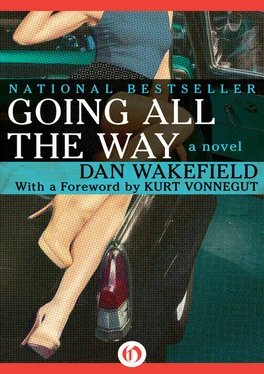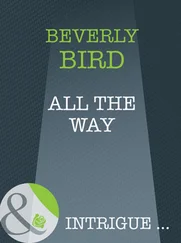Gunner thought the whole thing was full of shit but pretty funny, and he almost keeled over when he found out it cost Rumsley, Klinger, and Faxworth five hundred smackers to have him take the test and have it analyzed for him. Rumsley, Klinger, and Faxworth were pissed off at the results, and they even were suspicious that Gunner had cheated on the test, though he tried to explain he would never have been able to figure out how to cheat in a way that would make him turn out as a flying charity forest-ranger, with tendencies toward masturbation and alcoholism. They agreed, grumbling, that maybe the Ad Game wasn’t his cup of tea.
Gunner went right to the V.A. office after all that and came one day to tell Sonny he had decided to take off right away for New York. He could probably get into Columbia for the second semester and get the GI Bill started then. In the meantime, he didn’t want to hang around Indianapolis any longer and he was going to go there and pick up some gear, take Nina out for a farewell dinner, and hit the road for New York. He figured he could get himself a room and land a job at the post office there. He knew some guys in service who said you could always get work sorting mail at night in the New York Post Office, and he would get a chance to really learn the city and psyche things out.
“By the time you get on your feet,” he said, “I’ll have the place down cold. You can probably get into Columbia for the spring semester—I brought you the catalog, and the GI Bill forms and shit. We’ll have two-twenty a month between us just from the bill. We can chip in on an apartment, live on spaghetti and wine. Do the whole thing. New York .”
He made it sound as exciting as when Sonny met him on the train and he spoke in that same tone of awe and adventure when he talked of “Ja- pan .”
“O.K., buddy,” Sonny said, smiling. “You’re on.”
Gunner was catching a train back to Naptown that night; when he made up his mind, he didn’t let any grass grow under his ass. He stood up quickly, seeming all business and rush, and said, “Look, let’s not have any goodbye shit, I’ll write from New York, and you’ll be out there in no time.”
“Right,” Sonny said.
Gunner reached down and squeezed him on the arm, his hand warm and strong, and said, “Take it slow, buddy. Don’t let ’em get to you. It won’t be long.”
“Thanks,” Sonny said. “I mean it. Thanks a lot.”
Gunner waved his hand away, brushing off any thought that thanks were needed for being a great friend and helping a guy figure out what the hell to do next, helping him be able to do it. It reminded Sonny of the way Gunner would brush off credit for his touchdowns or his Purple Heart, his exploits as a cocksman or his loyalty to friends.
He was gone, and Sonny first felt a scary kind of loneliness, and then began to calm down, thinking of the great days ahead in the great City of New York, a place of teeming life and triumph and glory. Surely in a place like that his real life might begin.
Sonny’s parents came up every weekend and sat around the room. His mother brought him magazines and slipped copies of the inspirational booklet “The Upper Room” in between the Lifes and Newsweeks and other stuff he asked for. Sonny never mentioned it, not wanting to start anything. His father got him a portable radio, and some kind of reading glasses fixed so that you could hold a book in your lap and be lying flat on your back and be able to read it by wearing the glasses.
Sonny told them once he had filled out forms for the GI Bill and applied to go to Columbia Graduate School in the second semester. He had spent hours pouring over the catalog Gunner had given him of the School of General Studies at Columbia, which was sort of their night-school branch and was easier to get into. Gunner was going to take some philosophy—he couldn’t get the bill unless you took stuff leading to a degree, so painting was out, but he could do that on the side—and Sonny figured he might try philosophy, too. If you had a guy you could talk to about it, maybe you could make some sense out of it, maybe learn some of the real secrets of life discovered by the great thinkers. When he mentioned this plan to his parents, his mother started to cry and his father said, “Well, there’s plenty of time to think about it.”
“I’ve thought about it,” Sonny said.
He left it at that, knowing there would be scenes and terrible arguments later when he got back home, but there was no use going through them in advance. Sonny tried to keep the talk to just gossip, which passed the time and didn’t make scenes and kept his mother from getting sad while she was telling the latest—how the lady Sonny had met when he first got home had gone back to the little Wop grocery-store man, after all he had put her through; how Uncle Buck didn’t pay any rent to Grandma Lee-no, even though he had enough money to go out carousing every night, and had only last week been discovered in Lee-no’s rollaway bed in the dining room with a woman Lee-no swore was a gypsy!
“How could Lee-no tell she was a gypsy?” Sonny asked.
“Well, she was very dark-complected, and she had on those big hoop earrings they wear, big as bracelets!”
“I bet Lee-no called out the Army, the Navy, and the Marines that time.” Sonny smiled.
Mr. Burns snorted, smiling himself. “And the Air Force and the Coast Guard,” he said.
“Let’s change the subject,” Mrs. Burns said. She didn’t like anyone to make fun of Lee-no or Buck, and Sonny and his father were always doing it. Just in a little way. It was one of the few things between them, a private kind of joke that they had to be careful about going too far with in Mrs. Burns’ presence.
The trouble was, when the news and gossip was over, the three of them were stuck again with nothing to say. And Sonny couldn’t get up and walk out, either.
His favorite amusement got to be listening to the late-night radio programs. He could pick up Randy’s Record shop from Gallatin, Tennessee, with hillbilly music and all kinds of advertisements of weird stuff like “the flowering blue rose bush” that was guaranteed to make an entire fence of blue roses tall enough to hide your house. They also advertised all the Jesus stuff, the emblems and statues that glowed in the dark, Jesus stickers for your car, Jesus trinkets for your charm bracelet. “Just send a postcard to Jesus—that’s J-E-S-U-S, care of this station.” There must have been thousands and thousands of people out there, saving up to buy statues of Jesus and flowering blue rose bushes.
Sonny got postcards from Gunner of Columbia University, Grant’s Tomb, the Brooklyn Bridge, saying stuff like “Great!” and “Wait’ll you see it!” He wrote a letter saying he had got himself a room up near Columbia where there were a lot of students living and you shared a moldy kitchen, but it was cheap. He had actually landed the job in the post office, sorting mail, and met a lot of interesting people, people from all over the country who really wanted to do something, wanted to figure things out, and Gunner was really getting to know the city, had been to a party in Greenwich Village already and learned how to get around on the fucking subways. He said for Sonny to get on his feet and get his ass out there, he’d have everything set up.
The mail was mostly those postcards from Gunner and get-well cards from Buddie Porter. Once Sonny’s parents brought her up as a special surprise when they came on one of their weekend visits and she sat around the room with them uneasily, and Mrs. Burns made a big point of dragging Mr. Burns off and saying they ought to give Buddie some time alone with Sonny, giggling a lot and making Sonny embarrassed as hell.
Читать дальше












